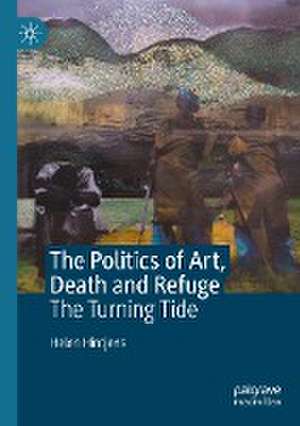The Politics of Art, Death and Refuge: The Turning Tide
Autor Helen Hintjensen Limba Engleză Paperback – 9 dec 2023
| Toate formatele și edițiile | Preț | Express |
|---|---|---|
| Paperback (1) | 769.09 lei 6-8 săpt. | |
| Springer International Publishing – 9 dec 2023 | 769.09 lei 6-8 săpt. | |
| Hardback (1) | 773.37 lei 6-8 săpt. | |
| Springer International Publishing – 9 dec 2022 | 773.37 lei 6-8 săpt. |
Preț: 769.09 lei
Preț vechi: 937.92 lei
-18% Nou
Puncte Express: 1154
Preț estimativ în valută:
147.23€ • 151.42$ • 122.14£
147.23€ • 151.42$ • 122.14£
Carte tipărită la comandă
Livrare economică 17 februarie-03 martie
Preluare comenzi: 021 569.72.76
Specificații
ISBN-13: 9783031098932
ISBN-10: 3031098935
Ilustrații: XX, 321 p. 30 illus., 2 illus. in color.
Dimensiuni: 148 x 210 mm
Greutate: 0.45 kg
Ediția:1st ed. 2022
Editura: Springer International Publishing
Colecția Palgrave Macmillan
Locul publicării:Cham, Switzerland
ISBN-10: 3031098935
Ilustrații: XX, 321 p. 30 illus., 2 illus. in color.
Dimensiuni: 148 x 210 mm
Greutate: 0.45 kg
Ediția:1st ed. 2022
Editura: Springer International Publishing
Colecția Palgrave Macmillan
Locul publicării:Cham, Switzerland
Cuprins
Part I: The Politics of Art: All at Sea.- Chapter 1: Introduction: Diving In.- Chapter 2: Two Artists and the Tides.- Chapter 3: Decolonising Contemporary Art? Collage+.- Part II: Drowning and Waving.- Chapter 4: Fluidity, Death, Denial: The Rwanda Genocide.- Chapter 5: Death and the Mediterranean.- Chapter 6: Undocumented People’s Self-Advocacy: Between Drowning and Dreaming.- Part III: Back to Sea: Imperial Sunsets.- Chapter 7: Fear of Flooding: Convivial Racism in The Netherlands.- Chapter 8: HMS UK Hits the Rocks.- Chapter 9: Concluding Notes: Flotsam and Jetsam.
Notă biografică
Helen Hintjens is Assistant Professor in Development and Social Justice at the International Institute of Social Studies in The Hague, The Netherlands. For more than 30 years she has studied the comparative asylum policies of EU member states in the context of broader post-colonial relationships and ideas. Her particular interests are in pro-asylum advocacy networks and activists, the politics of selective urban surveillance of undocumented rejected asylum seekers, and networks of 'cities of sanctuary', as well as resistance to deterrence-based measures of destitution, detention and forced deportation. Her regional focus is on the countries of the Great Lakes region, especially Rwanda and Eastern DRC, and the relations of francophone Africa with EU member states. She works on peace-building, including through music and the arts, in Rwanda and the wider region.
Textul de pe ultima copertă
This book deals in different ways with the politics of death, with art and politics and with the politics of refuge and asylum. Cutting across these fields brings to the fore the fluid quality of social life under late capitalism. The elements of time, space and emotion are part of the overall approach adopted. The individual chapters illustrate themes of despair, striving and the politics of hope, and bring out the fluid and unpredictable qualities of social life. The guiding metaphor is fluidity, or what Urry refers to as “waves; continuous flow; pulsing; fluidity and viscosity” characteristic of life, death, refuge and art under the contemporary global system. Between the worlds of culture, political violence and art, the interconnected themes in this study illuminate conditions of 'liminality', or in-betweenness. The study presents a politics of hope under late capitalism, and cuts through more usual boundaries between art and science, harm and help, death and the politics of barelife. Each chapter grapples with issues that help illustrate wider trends in Global Development and International Relations scholarship and teaching. Amidst growing cynicism about human or even humanitarian values, the volume appeals for a politics of hope and social justice, based on the fluid contours of borderless and amorphous processes of self-organising and radical anarchy.
Helen Hintjens is Assistant Professor in Development and Social Justice at the International Institute of Social Studies in The Hague, The Netherlands. For more than 30 years she has studied the comparative asylum policies of EU member states in the context of broader post-colonial relationships and ideas. Her particular interests are in pro-asylum advocacy networks and activists, the politics of selective urban surveillance of undocumented rejected asylum seekers, and networks of 'cities of sanctuary', as well as resistance to deterrence-based measures of destitution, detentionand forced deportation. Her regional focus is on the countries of the Great Lakes region, especially Rwanda and Eastern DRC, and the relations of francophone Africa with EU member states. She works on peace-building, including through music and the arts, in Rwanda and the wider region.
Caracteristici
Assumes that human beings will paddle through better if art and politics find common ground Illustrates what we can gain from an aerial view, or rather from a connected, liquid view of late capitalism Traces the contours of an uneasy apartheid system that separates humanity into the privileged and the outcasts
